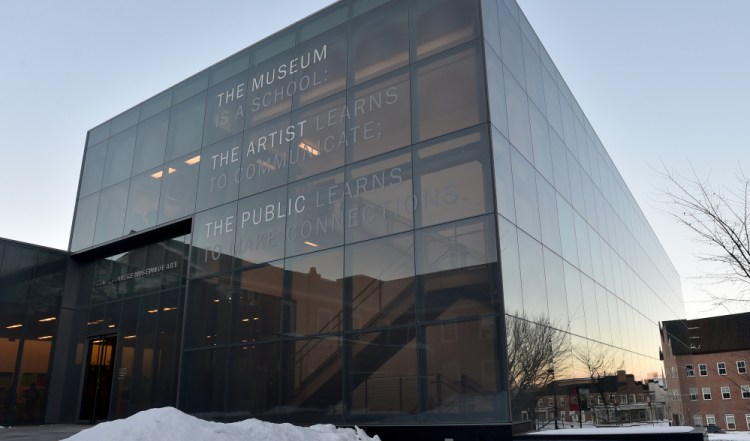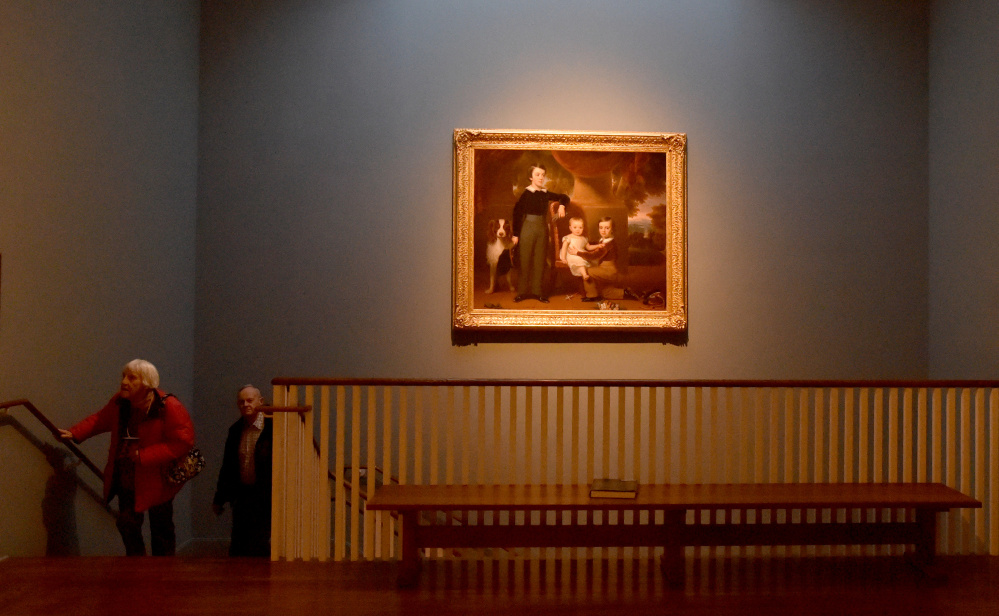WATERVILLE — The Colby College Museum of Art has received a gift of more than $100 million from longtime museum supporters Peter and Paula Lunder, marking the latest in a series of mammoth donations from the benefactors that college officials say will help cement the region’s reputation as a world-class arts destination.
The gift, the second Lunder gift of more than $100 million, includes about 1,500 works of art and will launch the Lunder Institute for American Art, whose focus will be the practice, study and exhibition of American art. As part of the institute, scholars, artists and curators will work with students from all disciplines.
Colby officials say the gift, which was announced Thursday night at a meeting of Colby trustees in Boston, helps establish Colby as the only liberal arts college with a high-end museum and a global research center on American art.
“The Lunders’ generosity has transformed Colby College and the arts landscape in Maine,” Colby President David A. Greene said in a statement. “Now, with this gift to significantly expand the collection and create the Lunder Institute, the museum will become a global destination for artists, scholars, and visitors. Colby students and faculty already make use of the museum in innovative ways and this development will expand their opportunities for research and scholarship in all disciplines. We are grateful for Peter and Paula Lunder, for their tremendous commitment to Colby, the Colby museum and the people of Maine.”
The gift announcement comes as Colby is working with the city of Waterville to help revitalize the downtown, boost economic development, build on and enhance arts offerings and bring more people to live and work downtown. In October, those downtown revitalization efforts got a massive boost when the Harold Alfond Foundation and Colby College officials announced they will infuse $20 million into projects to launch what eventually will become “tens of millions of dollars more” in downtown investments.
Colby bought five vacant buildings downtown and demolished two, with plans to build a boutique hotel and a residential complex for Colby students and staff members who will be part of a community service-based curriculum, and to renovate some of the buildings to make way for offices, retail uses and the arts. Colby also works closely with arts organizations in the city.
The Colby museum, which is free and open to the public, was founded in 1959 and has five wings, more than 9,000 works of art and more than 38,000 square feet of exhibition space. It’s the biggest museum in Maine and is already considered top among the most significant and largest college art museums in the United States.
Works by American artists include those of Mary Cassatt, John Singleton Copley, Gilbert Stuart, Albert Bierstadt, Winslow Homer and William Merritt Chase. John Marin, Marsden Hartley, Georgia O’Keeffe, George Bellows, Rockwell Kent and Alex Katz also are featured. The museum also includes Greek and Roman antiquities, European drawings and prints and early Chinese art.
The Lunder gift includes paintings, sculpture, photography and works on paper dating from 1501 to 2014 and representing than 150 artists, according to a Colby news release. They include Cassatt, Vincent van Gogh, James McNeill Whistler, Jasper Johns, Nina Katchadourian, Jacob Lawrence, Maya Lin, Joan Mitchell, Claes Oldenburg, Betye Saar, Rembrandt van Rijn, Ai Weiwei and Fred Wilson.
The Lunders, both of whom serve on the museum’s board of governors, are former Waterville residents and longtime Colby and museum benefactors. Peter Lunder is a 1956 Colby graduate, and both he and his wife hold honorary Colby degrees. They have been members of the college’s board of trustees since 1998.
In 1995 the Lunders pledged the lead gift to the museum’s Lunder Wing, designed by architect Frederick Fisher and inaugurated in 1999. In 2007, the couple donated to the museum hundreds of works of art valued at more than $100 million. Six years later, the Alfond-Lunder Family Pavilion opened to display the works.
Last year, the Lunders donated a set of 100 of Pablo Picasso’s etchings from the 1930s that are considered the artist’s “greatest achievement in the print medium” and a hallmark of 20th-century modernist printmaking.
“For many years we have been inspired and impressed by Colby’s teaching mission and the many ways that the museum is deeply integrated into the curriculum to become a vibrant part of college life,” the Lunders said in a joint statement. “We are delighted that our art collection will be shared with future Colby students, the Waterville community and visitors to Maine, and we know that Colby College will do a marvelous job enhancing the collection with their academic programs. We feel that Colby is the perfect home for our collection.”
The Lunder Institute for American Arts will enable students of all disciplines to interact with scholars and artists in an intensive residency program, according to the college. Students of all disciplines now use the museum’s collection and exhibits as part of bioscience, film, psychology, foreign language and other studies. The institute is poised to become a pre-eminent research center for American art, according to Colby officials.
Students studying a range of disciplines from anthropology to music will have access to the museum and research center, a unique space for dialogue and mentorship with scholars and artists, the Colby news release says.
The institute will build on experiences students have had at the museum, such as being involved in a biodiversity laboratory that used artwork to identify landscapes and determine the latitude and longitude of each site; a psychology class in which students chose artwork to analyze the psychological dimensions of facial symmetry, aesthetic beauty and other artistic principles; and an English class in which students were asked to analyze and compare poetic form in the works of Emily Dickinson and Whistler.
Sharon Corwin, the Carolyn Muzzy director and chief curator of the Colby College Museum of Art, said Colby is “especially interested in bringing together innovative artists and scholars to reflect on the historical and cultural parameters of ‘American art’ as an evolving field of intellectual inquiry and creative practice.”
“This reflection comes at a moment when the field is calling for more expansive definitions of this term, urging the world to see beyond the borders of the United States and make trans-national connections across materials and methodologies. The Lunders’ generosity will enable Colby to be at the forefront of this exciting moment in the field.”
Colby officials say the new Lunder Institute will host a residential program for scholars and artists, both on campus and downtown.
“Summer and academic year residencies, ranging from several weeks to a year, will be offered to graduate students, scholars, curators and emerging and internationally renowned artists who could develop new site-specific works on campus in the community,” the Colby release says. “These fellows will be a strong part of the intellectual and creative life of the college, working directly with faculty, students and community members and inspiring a dialogue between art creation and scholarship.”
Brian Clark, Colby’s vice president of planning, who has been working on downtown revitalization efforts, said in an interview Thursday that the Lunder gift is “incredibly meaningful” for the college and museum, as well as for the work Colby is doing with many arts organizations in Waterville to help make it a destination for the arts.
“The prospect of bringing scholars and artists to Waterville through the Lunder Institute for American Art presents incredible new opportunities for engagement with arts organizations throughout Waterville, and the collection of the museum offers the opportunity for the community to engage with significant works of art,” Clark said. “I love that Waterville, Maine, is home to one of the most important collections of American art in the country. The arts are a driver of economic development, and through this new institute and the collection, the museum will attract an even greater number of visitors from around the country to come to Colby and to Waterville.”
A key part of the overall strategy for downtown is to build upon the successes of exceptional arts organizations in the city, including the Waterville Opera House, Railroad Square Cinema, Common Street Arts, Waterville Creates! and the Colby museum, according to Clark.
Kate Carlisle, Colby’s communications director, said there will be opportunities for scholars and artists coming to Waterville as part of the Lunder Institute to engage not only with students, but also with the larger community in various ways.
Carlisle said that what’s exciting to her is “it’s really another step in making not just Colby, but Waterville and mid-Maine, a real destination for art.”
Amy Calder — 861-9247
Twitter: @AmyCalder17
Send questions/comments to the editors.





Comments are no longer available on this story